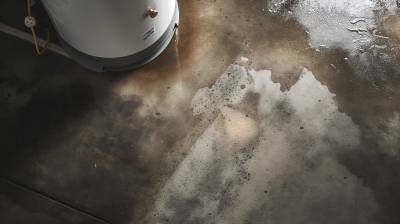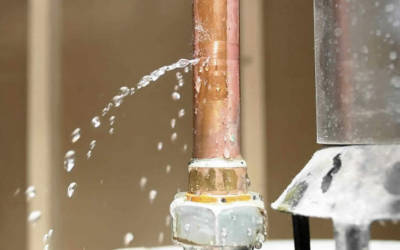Water heater leaking is a problem that creeps up in almost every household or commercial building over time. The issue of a leaking water heater is not only inconvenient but also can lead to costly repairs if not addressed promptly. Besides, water leaks can lead to escalated utility bills due to excessive water usage and can also cause substantial damages to your property. This comprehensive guide aims to provide you with extensive information on the causes of water heater leaks, how to troubleshoot and fix them, and the crucial role of professional assistance in rectifying significant problems.
Identifying Causes of a Water Heater Leaks
Before you proceed with fixing a leaking water heater, it’s crucial to understand the possible causes. Not each leak is the same and being aware of the root cause can help in the fast and efficient resolution of the problem.
Wrong Pressure
One of the leading causes of water heater leaking is incorrect pressure. When there’s too much pressure inside the tank, the water needs to escape, leading to leaks. Excessive pressure generally happens if the temperature of the water heater is set too high or if the exterior water supply provides water at a high pressure.
Old Tank
Your water heater’s lifespan can play a significant role in leaks. Over time, sediment in the water can gather at the bottom of the tank, leading to rust, holes and, eventually, leaks.
Faulty Valves
Both the pressure relief valve and drain valve can cause water heater leaks if they become loose or fail to function appropriately. A leak from these valves can be fixed by tightening or replacing them.
How to Address a Water Heater Leaking Issue?
A leaking water heater may require a seamless blend of DIY troubleshooting methods and professional intervention. Here are some steps to help you fix this problem.
Turn Off Electricity and Water Supply
Before you start working on a leaking water heater, turn off the necessary utilities for safety. It is also essential to let the water in the tank cool down to avoid any accidents due to hot water.
Locate the Leak
Determine the source of the leak. This step involves visual inspection to identify if the water is coming from the top, bottom, or the valves.
Fixing Leaks
Top leaks: These often result from loose pipe connections or faulty valves. You may try to tighten the valve or connection to fix the problem.
Bottom leaks: Leaks at the bottom could be due to a corroded tank requiring a complete replacement.
Valve leaks: If the leak is from the valve, you may try replacing the faulty valve.
Call in the Professionals
Remember, not all leaks are easy fixes. Sometimes, it takes the knowledge and experience of a professional plumber to address the problem in the best possible way. If you've attempted self-repairs without success or if the issue is beyond your skill level, it's time to call in the professionals.
Prevention Tips for Water Heater Leaking
Preventive maintenance can help you avoid the trouble of dealing with a leaking water heater.
- Regularly drain your tank to prevent the build-up of sediment.
- Keep a check on the water pressure within the tank.
- Monitor the anode rod to keep rusting at bay.
- Ensure to check all valves and connections periodically.
- Schedule professional inspections annually or bi-annually depending on your water heater's condition.
Understanding 'water heater leaking' can empower you to protect your appliances and home from possible damage. Proper attention, timely identification and intervention, coupled with preventive practices, can help ensure the longevity of your water heater while keeping those annoying leaks away.
Frequently Asked Questions About Water Heater Leaking
Why is my water heater leaking?
Your water heater may leak due to a range of reasons. It could be a result of general degradation over time, high pressure, corrosion due to sediment build-up, a broken drain valve, or even due to a fault or crack in the tank itself. It is advisable to get a professional plumber to diagnose the exact cause.
Can a leaking water heater be fixed?
Yes, a leaking water heater can often be fixed, but the repair method depends on what exactly is causing the leak. Smaller issues like a damaged valve or slight tank damage can usually be repaired, but if the tank is extensively damaged or the leak is due to heavy corrosion, you may need to replace the whole unit.
What happens if I ignore the leak in my water heater?
Ignoring a leak in your water heater can lead to more severe problems in the future. Besides leading to wastage of water, it could also cause damage to your property, increase your utility bills, and even pose safety risks. If the leak worsens, it could lead to a full-blown flooding situation.
How critical is an immediate fix for a water heater leak?
It's usually critical to fix a water heater leak immediately to avoid aggravation of the problem. An unattended leak could compromise the functionality of the heater, increase your energy bills, cause significant home damage, and in severe cases, it could even become a safety hazard.
How will a professional fix my leaking water heater?
A professional plumber will first locate the source of the leak. Depending on the cause, they might change the pressure relief valve, fix leaks in the pipe connections, or repair the broken drain valve. In the case of a severely corroded or cracked tank, they might advise a total replacement.
How much does it typically cost to repair a leaking water heater?
The cost of repairing a leaking water heater can vary greatly, depending on the exact problem and your region. A relatively affordable fix could be replacing a valve, which could range from $150-$200. However, if your entire water heater needs to be replaced, it could cost anywhere from $800 to $1,500 including the cost of the new heater and labor.
What are some common signs of water heater leakage?
Some common signs indicating a leak in your water heater could include finding water pooling around the base of the tank, frequent requirement of reheating, seeing rust or corrosion on the heater, or hearing unusual noises like popping or cracking from the tank.
Can I take preventive measures to avoid water heater leaks in the future?
Yes, scheduled maintenance and periodic inspections by a professional can help you avoid leaks in your water heater in the future. Regularly draining and flushing out the tank can help prevent sediment build-up, thus reducing the chances of corrosion and subsequent leaks.
What is the typical lifespan of a water heater and could that affect leakage?
The average lifespan of a water heater is typically around 8-12 years. As they age, components may wear out, and the tank could start to corrode, substantially increasing the chances of leaks. So if your heater is nearing the end of its expected lifespan, it is wise to start considering a replacement.
Can a leaking water heater explode?
While extremely rare, a leaking water heater can explode if the temperature and pressure relief valve is malfunctioning, and the pressure within the tank builds up to dangerous levels. Never ignore a leak as it might be indicating a serious underlying issue with your water heater.
Summary
It's essential to address a water heater leaking issue as soon as it's detected. If left unchecked, it can cause damage to your property, from the flooring to the walls, and even disrupt your daily activities. Not only can it affect the efficiency of your heater, but it can also potentially lead to higher utility bills. Regular inspection and maintenance from a skilled professional can help you avoid such problems.
Dealing with a water heater leaking from the top or bottom might not always seem like a big deal at first. However, if the leak gets worse, it could lead to a major flood in your house, causing costly water damage. Furthermore, your water bill might skyrocket if the leak isn't stopped. Therefore, early detection and professional intervention are keys to minimizing potential risks associated with a water heater leak.
A water heater leaking is a clear sign that your system needs immediate attention. It's not just the inconvenience and the possible damage to your home you have to worry about, but also the extra costs involved in fixing problems like mold, and structural issues. Awareness, quick action, and regular check-ups could prevent unexpected expenses and damages in your home.
About West Coast Hydronics & Plumbing
Welcome to West Coast Hydronics & Plumbing, your reliable and dedicated partners from Sacramento, CA. We are a professional team of experts focused on delivering exceptional plumbing and hydronic heating services. We pride ourselves on our in-depth industry knowledge, excellent workmanship, and unwavering commitment to client satisfaction. Our services cover everything from routine maintenance to complex installations. Ready to start your next project? Visit our website for more information. Let's work together to make your home or business the best it can be.





